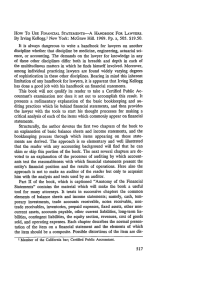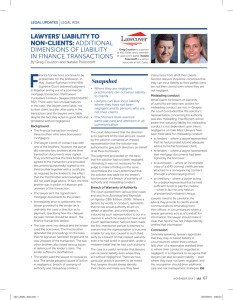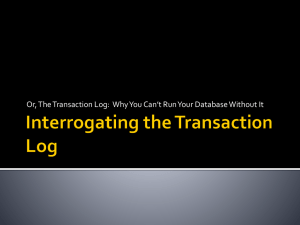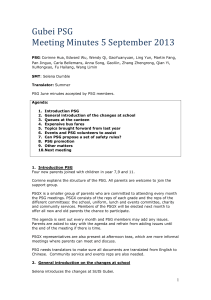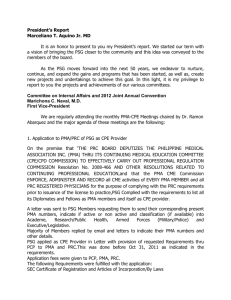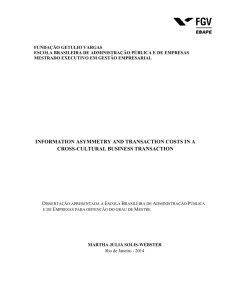Guidance notes for Foreign Opinion Letter
advertisement
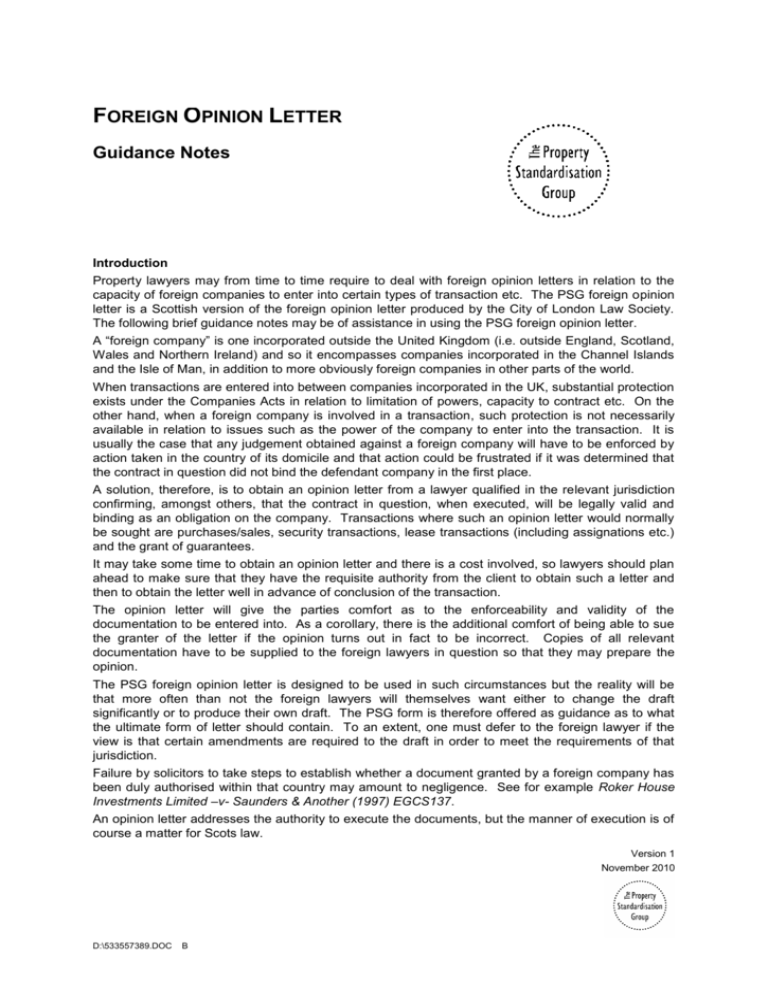
FOREIGN OPINION LETTER Guidance Notes Introduction Property lawyers may from time to time require to deal with foreign opinion letters in relation to the capacity of foreign companies to enter into certain types of transaction etc. The PSG foreign opinion letter is a Scottish version of the foreign opinion letter produced by the City of London Law Society. The following brief guidance notes may be of assistance in using the PSG foreign opinion letter. A “foreign company” is one incorporated outside the United Kingdom (i.e. outside England, Scotland, Wales and Northern Ireland) and so it encompasses companies incorporated in the Channel Islands and the Isle of Man, in addition to more obviously foreign companies in other parts of the world. When transactions are entered into between companies incorporated in the UK, substantial protection exists under the Companies Acts in relation to limitation of powers, capacity to contract etc. On the other hand, when a foreign company is involved in a transaction, such protection is not necessarily available in relation to issues such as the power of the company to enter into the transaction. It is usually the case that any judgement obtained against a foreign company will have to be enforced by action taken in the country of its domicile and that action could be frustrated if it was determined that the contract in question did not bind the defendant company in the first place. A solution, therefore, is to obtain an opinion letter from a lawyer qualified in the relevant jurisdiction confirming, amongst others, that the contract in question, when executed, will be legally valid and binding as an obligation on the company. Transactions where such an opinion letter would normally be sought are purchases/sales, security transactions, lease transactions (including assignations etc.) and the grant of guarantees. It may take some time to obtain an opinion letter and there is a cost involved, so lawyers should plan ahead to make sure that they have the requisite authority from the client to obtain such a letter and then to obtain the letter well in advance of conclusion of the transaction. The opinion letter will give the parties comfort as to the enforceability and validity of the documentation to be entered into. As a corollary, there is the additional comfort of being able to sue the granter of the letter if the opinion turns out in fact to be incorrect. Copies of all relevant documentation have to be supplied to the foreign lawyers in question so that they may prepare the opinion. The PSG foreign opinion letter is designed to be used in such circumstances but the reality will be that more often than not the foreign lawyers will themselves want either to change the draft significantly or to produce their own draft. The PSG form is therefore offered as guidance as to what the ultimate form of letter should contain. To an extent, one must defer to the foreign lawyer if the view is that certain amendments are required to the draft in order to meet the requirements of that jurisdiction. Failure by solicitors to take steps to establish whether a document granted by a foreign company has been duly authorised within that country may amount to negligence. See for example Roker House Investments Limited –v- Saunders & Another (1997) EGCS137. An opinion letter addresses the authority to execute the documents, but the manner of execution is of course a matter for Scots law. Version 1 November 2010 D:\533557389.DOC B 2 Brief Commentary on PSG Foreign Opinion Letter Preamble It is important to establish the party or parties to whom the opinion letter is to be addressed. 4. The lawyer giving the opinion may wish to amend or add assumptions. 5. This contains the meat of the opinion and needs to be tailored to the actual transaction, on the basis that some of the suggested confirmations may be irrelevant in the particular circumstances of the transaction. 6. Here the lawyer providing the opinion is given an opportunity to make appropriate qualifications, which will need to be reviewed on a case by case basis. 7. The matter of whether the opinion is granted solely to one party or to successors is important and needs to be considered in each case. The granter of the letter will be keen to restrict his or her liability as much as possible, but consideration should be given to the availability of the opinion letter for parties in the future. In the case of purchases where land registration very much rules these days, there may be no particular issues as to the capacity of foreign companies following registration of the title. On the other hand, if a foreign company is acting as guarantor of lease obligations, then it may be beneficial to have an opinion letter in relation to the guarantor which is available to successor landlords following a sale of the investment; failing that, the purchaser will either have to take a view or procure its own opinion letter at the time. D:\533557389.DOC B




